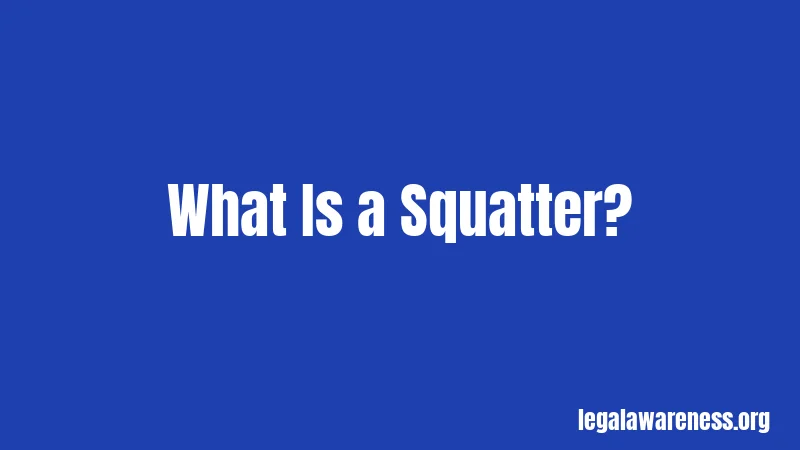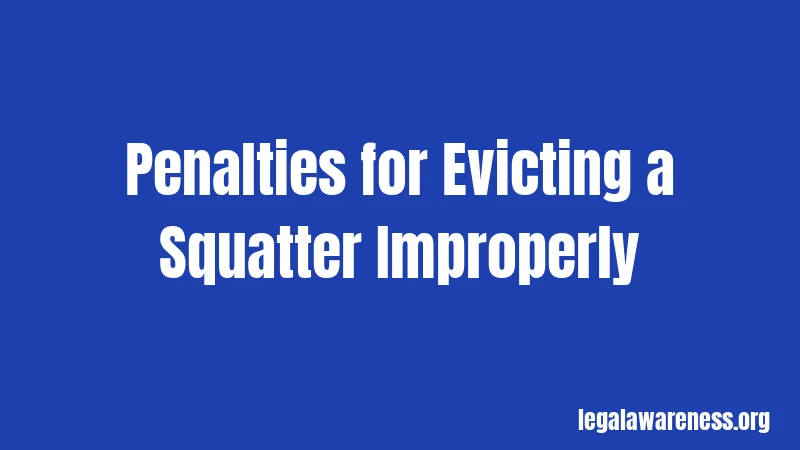Squatter Laws in Ohio (2026): Your Complete Legal Guide
Most people have no idea that squatters have legal rights in Ohio. Seriously. But they do, and it’s complicated. The good news? You don’t need to be confused anymore. Let’s break down exactly what you need to know about squatters, adverse possession, and what the law actually allows.
Here’s the thing: Ohio has specific laws about who owns land and for how long someone can live on property without permission. These laws protect property owners, but they also protect people in certain situations. We’re going to walk through all of it.
What Is a Squatter?

A squatter is someone who moves into a property without the owner’s permission. They don’t rent it. They don’t have a legal right to be there. They just move in and start living there. Sound rough? It is.
But here’s where it gets interesting. Ohio law recognizes something called “adverse possession.” This is basically a legal pathway where a squatter can actually become the owner of the property. It’s not quick, and it’s not easy, but it can happen.
Think of it like this: if someone uses your land openly and continuously for a long time, the law might eventually say it’s theirs. It seems backwards, right? But there’s a reason these laws exist.
Ohio’s Adverse Possession Laws
Okay, this is the part that matters most. In Ohio, a squatter can claim ownership of your property through something called adverse possession. But there are strict rules they have to follow.
Here’s what needs to happen for adverse possession to work in Ohio. The person living on the property must do seven things simultaneously. Miss even one, and the claim fails.
The person must occupy the land openly. This means they can’t hide. The whole neighborhood should basically know someone’s living there. No sneaking around or pretending to be a guest. This is public, obvious occupation.
The occupation must be exclusive. The squatter can’t share the property with the real owner. They have to act like they own it completely. The owner can’t be using the land at the same time.
The occupation must be hostile to the owner’s rights. Now, “hostile” doesn’t mean violent. It means the squatter knows they don’t have permission. They’re basically saying, “I’m taking this land,” without asking. The owner never gave them consent.
The occupation must be continuous. The squatter can’t just move in for a month, then leave for six months, then come back. They have to stay. They have to maintain the property. They have to live there regularly and without long interruptions.
The occupation must last 21 years. This is crucial. In Ohio, a squatter must occupy the property continuously for 21 years before they can claim it. Twenty-one years. That’s two decades plus one year. Most people don’t stay anywhere that long.
Wait, it gets better. The squatter also needs to pay property taxes for the entire 21-year period. Yep. They can’t just live there for free and hope nobody notices. They have to pay taxes like they own it.
And here’s the last part: they have to have color of title or actual possession with intent to claim ownership. Basically, they need to prove they intended to own the property all along. They weren’t just temporarily borrowing someone’s shed.
Not sure what counts as continuous? Let me break it down. Continuous means the squatter lives there most of the time. They maintain the property. They might plant a garden. They might paint the walls. They might fix the roof. It looks like someone actually lives there.
Penalties for Evicting a Squatter Improperly

Okay, pause. This part is important for property owners. You can’t just kick a squatter out yourself. You have to follow the law.
If you find a squatter on your property, you can’t use force to remove them. You can’t change the locks while they’re out. You can’t remove their belongings. Doing any of these things could get you in serious legal trouble.
Here’s what you actually need to do. You must file for eviction through the court system. This is called a forcible detainer action in Ohio. It’s a legal process, and it takes time, but it’s the right way.
The court will give the squatter a notice. They’ll have a chance to respond. If they don’t have a legal right to be there, the judge will order them out. Then, and only then, can you remove them.
Why all these rules? Because even squatters have rights under the law. They deserve due process. They deserve their day in court, just like anyone else.
How Long Before a Squatter Can Claim Your Land?
You’re probably thinking: “Okay, so what if I just ignore the problem?” Don’t. This is where things get serious.
If a squatter meets all seven requirements for 21 years, they can file a lawsuit to claim the property as theirs. A judge could actually side with them. Your land becomes theirs. You lose it completely.
This actually happens. It’s rare, but it’s real. People have lost properties worth hundreds of thousands of dollars because they didn’t know about these laws.
Here’s what most people miss: the squatter needs to pay taxes during those 21 years. If you check your property tax records, you might notice someone else is paying. That’s a red flag. That’s when you need to act.
Honestly, this is probably the most important thing to understand. Adverse possession is a real legal claim. It can happen in Ohio. It won’t go away just because you ignore it.
What If You’re Renting to Someone?

Here’s where it gets different. Let’s say you rented a property to someone, but they stopped paying rent and won’t leave. That’s not the same as adverse possession. That’s just an eviction.
In that situation, you can file an eviction after the tenant fails to pay. You don’t have to wait 21 years. You don’t have to worry about adverse possession. The renter has no legal claim to the property. They’re just occupying it without paying.
The court process is faster for evictions. You might get someone out in a few months instead of years. Still, you have to go through the courts. You can’t force them out yourself.
Special Circumstances and Exceptions
Wondering if there are special cases? There are. And they matter.
If the property is part of a family inheritance, the rules can be different. If there’s a clear written agreement, adverse possession might not apply. If the owner is out of the state or unreachable, the clock might still run.
Not sure how these affect your situation? That’s when you need a lawyer. These exceptions get complicated fast.
Also, Ohio law changed how adverse possession works if the original owner had a clear title to the land. Basically, if you have strong proof that you own the property, your defense is stronger. But you still need to challenge the adverse possession claim in court.
What Happens If a Squatter Claims Your Property?
So a squatter claims adverse possession. Now what?
If they file a lawsuit, you have the chance to fight back. You can argue that they didn’t meet one of the seven requirements. Maybe they left for three months. Maybe they didn’t pay taxes. Maybe they weren’t open about it.
You can hire a lawyer to defend your property. The court will listen to both sides. If the judge agrees with you, the squatter loses. Your property stays yours.
But here’s the thing: if you’ve ignored the situation for 21 years, your defense gets a lot weaker. By then, the squatter has probably met all the requirements.
This is why catching it early matters. If you notice someone living on your property, get legal help immediately. Don’t wait. The longer you wait, the more trouble you’re in.
How to Protect Your Property
Okay, let’s talk about what you should actually do. Stay with me here.
First, regularly inspect your property. Walk around it. Make sure nobody’s living there. Look for signs like new fencing, gardens, or buildings. Look for people living in structures on the land.
Second, if you find a squatter, document everything. Take photos. Write down dates. Note what they’re doing on your property. Get evidence of everything.
Third, contact a lawyer immediately. Don’t wait. Don’t try to handle this yourself. A lawyer can send a formal letter demanding they leave. This letter shows you’re not giving permission. It breaks the “hostile” requirement.
Fourth, file for eviction if they don’t leave. Go through the courts. Make it official. This protects you legally.
Fifth, post “No Trespassing” signs on the property. Make it clear that you don’t want people there. This is especially important if the land is vacant.
Sixth, consider installing a fence or gate. This shows exclusive control. It makes it harder for someone to claim they have a right to be there.
Seventh, keep your property taxes paid. If someone else tries to pay your taxes, object. The fact that they’re paying taxes is one of the requirements for adverse possession.
You could also rent the property to someone legitimate. If the land is generating income, squatters are less likely to move in.
What If You Own Vacant Land?
Vacant land is especially risky. Nobody’s living there, so it’s easy for a squatter to move in without you noticing.
Check on vacant property regularly. This is critical. The more you visit and maintain it, the harder it is for someone to claim adverse possession.
Consider hiring someone to maintain it. Have them mow, trim, and keep it looking occupied. This makes it clear that you control it.
Install surveillance cameras if possible. This gives you evidence if someone does move in. It also deters squatters from choosing your property.
Think about selling it if you can’t maintain it. Holding onto property you don’t use puts you at legal risk.
Recent Changes to Ohio Law
Ohio’s adverse possession laws haven’t drastically changed in recent years. The 21-year rule has been in place for a long time. The seven requirements stay the same.
However, courts have become stricter about what counts as “color of title” and “intent to claim.” Judges now require clearer evidence that the squatter intended to own the property. This actually helps property owners a bit.
Also, more courts are recognizing that paying taxes is incredibly important. If a squatter hasn’t paid taxes for the full 21 years, they’re likely to lose their claim.
Still, don’t count on the courts to save you automatically. The best defense is prevention. Don’t let the situation develop in the first place.
How to Report a Squatter
Okay, you’ve found a squatter. What’s your next move?
First, contact your local police department. File a report. Give them the address and description of the people. They might not remove the squatter, but you’ll have an official report. This helps if you end up in court.
Second, contact a local attorney. Most offer free consultations. Explain what’s happening. They’ll tell you your options.
Third, send a formal letter demanding they leave. Your lawyer can do this. The letter should say the person is trespassing and has no right to the property. Give them a deadline to leave, usually 30 days.
Fourth, if they don’t leave, file for eviction with the court. You’ll need to go to the courthouse and fill out paperwork. The court will assign a hearing date.
Fifth, at the hearing, present your evidence. Show photos. Show documents proving you own the property. The judge will likely order the squatter removed.
This whole process takes a few months, not years. It’s not fast, but it works.
Frequently Asked Questions
Can a squatter ever legally own my property in Ohio? Yes, but only if they meet all seven requirements for 21 continuous years, including paying property taxes. It’s rare, but it happens.
What should I do if I find someone living on my property? Document everything, contact a lawyer immediately, and file for eviction through the courts. Don’t try to remove them yourself.
Do squatters have any rights in Ohio? They have the right to due process, which means you must evict them through the court system, not by force.
How much does it cost to evict a squatter in Ohio? Court costs vary, but expect between $200 and $500 in filing fees, plus lawyer fees if you hire an attorney.
Can I change the locks if a squatter is living in my house? No. That’s illegal. You must go through the eviction process, even if the person has no legal right to be there.
What if the squatter has been there for only a few months? You can still evict them. They need 21 years of continuous occupation for adverse possession. A few months isn’t enough.
Do I need a lawyer to evict a squatter? You can represent yourself in eviction court, but having a lawyer makes the process much easier and faster.
Can a squatter claim adverse possession on a rented property? No. A renter cannot claim adverse possession. If they stop paying rent, they’re just a non-paying tenant, and you can evict them.
Final Thoughts
Here’s what you need to remember: squatter laws in Ohio are real, and they’re serious. A squatter can legally claim your property after 21 years of meeting specific requirements. It’s not something to ignore.
But you have power here. By staying vigilant, documenting issues, and getting legal help fast, you can protect what’s yours. Check your property regularly. Know what’s happening on your land. And if you spot trouble, act immediately.
If you own property in Ohio, talk to a real estate lawyer. Get familiar with these rules. Ask them specifically about adverse possession. Know your options before a problem develops.
Don’t be the person who loses their property because they didn’t understand the law. Now you understand it. Stay informed, stay alert, and when in doubt, call a lawyer. They’re worth the investment.
References
Ohio Revised Code Section 2126 – Adverse Possession
Ohio Courts General Information on Forcible Detainer
Legal Information Institute: Adverse Possession
